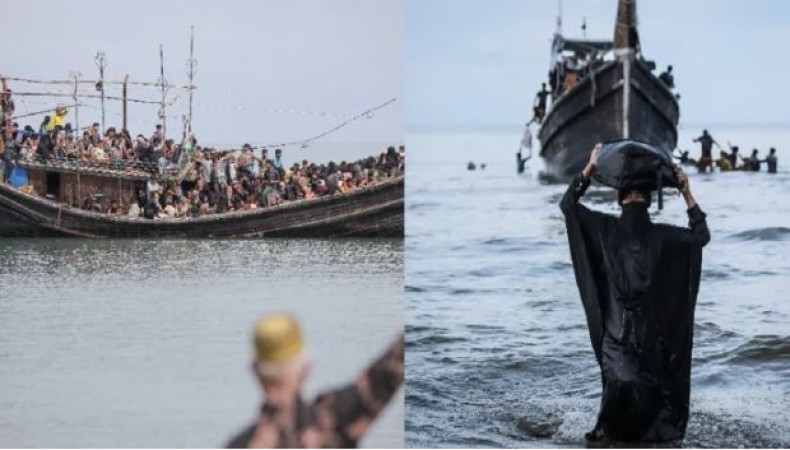
Jakarta: Around 250 Rohingya refugees faced a grim fate as they were pushed back into the sea off the western part of Indonesia on November 17, 2023. This incident has raised significant concerns over the deteriorating humanitarian crisis faced by the Rohingya people. Despite locals providing essential supplies, the refugees were denied the opportunity to land and were forced to continue their perilous journey.
The group, having fled persecution in Myanmar, reached the coast of Aceh province in Indonesia on Thursday. However, they encountered rejection in Indonesia, a country with the world's largest Muslim population, where 87 percent of the population follows Islam.
The boat, filled with Rohingya people, had departed from Bangladesh three weeks ago. After overcoming numerous challenges, the refugees reached the western part of Indonesia. Upon reaching the Aceh province's coast, some individuals swam to land but were sent back to the boat after a short time. Subsequently, the boat was compelled to head back out to sea.
The Rohingya, mostly Muslim minorities, annually risk their lives in long and expensive sea voyages, often on flimsy boats, in an attempt to reach countries like Malaysia or Indonesia. Local leader Saiful Afwadi expressed frustration with their presence, citing instances where refugees would run away upon landing, suggesting involvement of human trafficking agents.
In northern Aceh, locals in Uli Madan and Cot Truong villages supplied the refugees with provisions, including food, clothing, and gasoline, before sending their boats back out to sea on Thursday. The Rohingyas attempted to damage the boats to avoid being returned, but locals repaired them, revealing the complexities of the situation.
Chris Leyva, director of the Rohingya rights organization Arakan Project, noted that the refugees were forced to return due to opposition from villagers. The refugees had reached the region with the help of smugglers taking advantage of the trade route from Malaysia, attempting to smuggle people into Indonesia illegally.
An AFP investigation in 2020 exposed a multibillion-dollar, ever-evolving human-trafficking operation involving Rohingya community members. Despite pleas for assistance, the refugees were prevented from landing, emphasizing the ongoing challenges faced by the Rohingya community, often turned away from neighboring countries and left to risk their lives at sea.
More than 250 Rohingya refugees entered indonesia illegally by multiple boats from Myanmar.
— Major Surendra Poonia (@MajorPoonia) November 18, 2023
And Islamic country Indonesia sent them back to sea same night
If such thing happen in India then
Congress & all left libru start crying as if they can’t breath without Rohingiyas !… pic.twitter.com/f68dpgbH5P
In contrast, it is notable that in India, a secular country, Rohingya refugees reside, including illegal Rohingyas. However, efforts by the Indian government to expel illegal Rohingyas have faced opposition from parties like Congress, TMC, and AAP, with some instances of violence by sections of the Muslim community. This incident prompts a comparison, questioning why Indonesia, an Islamic country, refuses to accommodate 250 Rohingyas, while India faces opposition when taking steps to manage illegal Rohingya settlements. It raises the broader question of burden-sharing among the 57 Islamic countries globally, as none have stepped forward to provide shelter to the Rohingyas in need.
Why President Muizzu Is Advocating for the Absence of Indian Military in Maldives ?
Israeli Airstrikes Claim 47 Lives in Southern Gaza Residential Blocks
Dubai Faces Severe Disruption as Unusually Heavy Rainfall Triggers Widespread Flooding